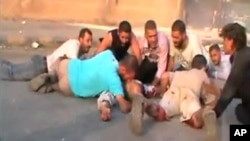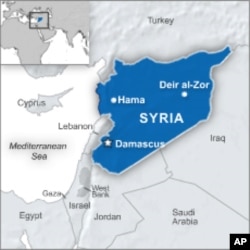Syrian forces have attacked civilian areas in the central city of Hama for a second day, as the U.N. Security Council meets to discuss President Bashar al-Assad's increasingly brutal crackdown on anti-government protesters.
Residents in Hama say tanks resumed intense shelling of the city late Monday, and that troops fired machine guns at worshippers about to head to mosques for special nighttime prayers on the first day of the holy month of Ramadan.
The shelling is reported to be the heaviest of the two-day military assault on the city. It appears aimed at preventing the mosque gatherings, perhaps fearing they would trigger larger protests.
The attacks also have targeted the eastern city of Deir el-Zour, where snipers on rooftops shot into the streets. The Wall Street Journal reported five people killed on Monday. Two more died in nearby al-Boukamal near the Iraqi border, including a 13-year-old boy shot in the head.
Syrian rights groups say at least 80 people were killed throughout Syria in Sunday's attacks, including 52 in Hama and neighboring villages.
The U.N. Security Council was holding an emergency, closed-door session late Monday at Germany's request to discuss Mr. Assad's increasingly brutal crackdown. A diplomat said Britain was expected to circulate a new resolution on Syria at the meeting.
In Washington, Secretary of State Hillary Clinton condemned the violence and appealed to Council members who have resisted efforts to adopt a resolution denouncing the Assad regime for its crackdown.
One of those countries, Russia, issued an unusual criticism of the Syrian government Monday, condemning "the use of force against peaceful protesters" and urging restraint. Turkey also sharply raised its public condemnation of Mr. Assad's government following the attacks on Hama.
The hardening reactions from Moscow and Ankara are potentially significant as Russia holds weight at the U.N. and Turkey is a regional power and important trade partner with Syria.
Also Monday, the European Union expanded sanctions against the Syrian government, imposing travel bans and asset freezes on five more officials associated with Syria's bloody crackdown.
EU Foreign Policy Chief Catherine Ashton condemned the recent attacks on citizens and said the "brutal violence" risks escalating tensions and divisions in the country.
The EU did not announce the names of the newly targeted Syrian officials. The bloc has sanctioned more than 30 people, including Mr. Assad, in its effort to stop the government's assault.
Ahead of the EU meeting, British Foreign Secretary William Hague called for stronger sanctions against Mr. Assad's inner circle, but said international military intervention is "not a remote possibility." Hague added that Arab countries must be among those pressuring the Damascus government.
It is difficult to verify accounts of the unrest in Syria because the government has barred most foreign media from reporting and traveling freely in the country. Some estimates say as many as 140 died in the clashes Sunday.
Rights groups say Syrian forces have killed at least 1,600 civilians during the crackdown. The government has blamed much of the violence on terrorists and militants who it says have killed hundreds of security personnel.
Some information for this report was provided by AP, AFP and Reuters.
















